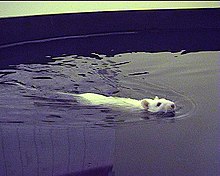Explicit memory
The retrieval of these episodic memories can be thought of as the action of mentally reliving in detail the past events that they concern.Semantic memory refers to general world knowledge (facts, ideas, meaning and concepts) that can be articulated and is independent of personal experience.Procedural memory builds rule-governed structure (merging or series) of forms and representations into complex structures such as: Broca's area is important to procedural memory, because, "Broca's area is involved in the expressive aspects of spoken and written language (production of sentences constrained by the rules of grammar and syntax).Agrammatism is apparent in Broca's aphasia patients, where a lack of fluency and omission of morphology and function words occur.Opposite of Broca's aphasia, paragrammatism is apparent, which causes normal or excessive fluency and use of inappropriate words (neologisms).An early attempt to understand memory can be found in Aristotle's major treatise, On the Soul, in which he compares the human mind to a blank slate.It was only in the late 1800s, however, that a young German philosopher by the name of Herman Ebbinghaus developed the first scientific approach to studying memory.In humans and other mammals, a cross-section of the hippocampus shows the dentate gyrus as well as the dense cell layers of the CA fields.[24] Recent studies of patients with damage to the amygdala suggest that it is involved in memory for general knowledge, and not for specific information.Visual cues that surround the pool (e.g. a chair or window) help the rat to locate the platform on subsequent trials.[28] The Odor-odor Recognition Task, devised by Bunsey and Eichenbaum, involves a social encounter between two rats (a subject and a demonstrator).The effects of this study can be observed in humans with amnesia, indicating the role of the hippocampus in developing episodic memories that can be generalized to similar situations.[28] Henry Molaison, previously known as H.M., had parts of both his left and right medial temporal lobes (hippocampi) removed which resulted in the loss of the ability to form new memories.[33] In the condition of Molaison the same results from this priming task are reflected when looking at the other basic memory functions like remembering, recall and recognizing.Adolph, Cahill and Schul completed a study showing that emotional arousal facilitates the encoding of material into long term declarative memory.It was also found that performance differed based on whether the participant responded to the stressful situation with an increase in measured levels of salivary cortisol.[43] It has been demonstrated that cortisone, a glucocorticoid, impaired blood flow in the right parahippocampal gyrus, left visual cortex and cerebellum.[43] A study by Damoiseaux et al. (2007) evaluated the effects of glucocorticoids on hippocampal and prefrontal cortex activation during declarative memory retrieval.[43] It is important to note that this study involved only male subjects, which may be significant as sex steroid hormones may have different effects in response to cortisol administration.[44] Studies on rats involving maze learning found that hippocampal neuronal assemblies that are used in the encoding of spatial information are reactivated in the same temporal order.[45] Similarly, positron emission tomography (PET) has shown reactivation of the hippocampus in slow-wave sleep (SWS) after spatial learning.[54] There is a relatively small body of evidence that supports the idea that REM sleep helps consolidate highly emotional declarative memories.For instance Ellenbogen, et al. argue that sleep actively protects declarative memory from associative interference.[47] The encoding of explicit memory depends on conceptually driven, top-down processing, in which a subject reorganizes the data to store it.[63] This is thought to happen because matching environments activates areas of the brain known as the left inferior frontal gyrus and the hippocampus.Having lost her short-term memory in a car crash, Lucy can only remember the current day's events until she falls asleep.[74] Guy Pearce plays a former insurance investigator suffering from severe anterograde amnesia, which was caused by a head injury.That loss of ability indicates that the head injury affected the medial temporal lobe of the brain, which has resulted in his inability to form declarative memory.Finding Nemo features a reef fish named Dory with an inability to develop declarative memory.The exact origin of Dory's impairment is not mentioned in the film, but her memory loss accurately portrays the difficulties facing amnesiacs.


long-term human memoryimplicit memoryconsciousrecollectionconsolidationepisodic memorypersonal experiencessemantic memorystimulusknowledgedeclarative knowledgeunconsciouslyvocabularyAutobiographical memorymemoryepisodicsemanticSpatial memorycognitive mapPrimingPerceptual learningCategory learningEmotional learningProcedural learninghabitslexiconidiomsPhonologyInflectional and derivational morphologyBrodmann's areaBroca's aphasiaAristotle'sOn the Soulblank slateHerman EbbinghausLearning CurveEndel TulvingDaniel Schacterneuroimagingcognitive psychologyhippocampusparahippocampusrecognition memoryPiaget's Transitive Inference Taskneuronsdentate gyrusPrefrontal cortexDorsolateralautonoetic consciousnessTulving's theoryamygdalaflashbulb memoriesSeptember 11 attacksassassination of JFKdiencephalonoccipital lobetemporal lobefusiform gyrusLesionMorris water navigation taskHenry MolaisonStressPosttraumatic stress disorderchronic stressStress can alter memory functionsrewardimmune functionmetabolismmental illnessesCortisolglucocorticoid receptorsFunctional magnetic resonance imagingmemory consolidationSlow-wave sleepsleep spindleREM sleepassociative interferenceencodingstimuliFergus CraikRetrievalneuralrhinal cortexthalamusneocortexbrainstemacetylcholineserotoninnoradrenalinetraumatic brain injuryAlzheimer's diseaseAmnesia50 First DatesMementoGuy Pearceanterograde amnesiaFinding Nemoreef fishGollin figure testAnnual Review of PsychologyBibcodeMarkowitsch, H.Human memoryStorageRecallAttentionNeuroanatomySensoryEchoicEideticEyewitnessHapticIconicMotor learningVisualShort-termThe Magical Number Seven, Plus or Minus TwoWorking memoryLong-termActive recallAutobiographicalFlashbulbHyperthymesiaImplicitMeaningful learningPersonal-event